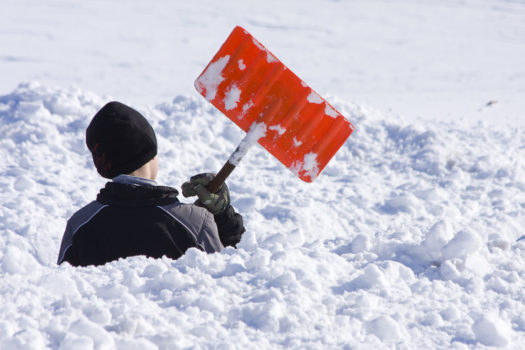
The New Jersey Supreme Court has brought much-needed clarity to an issue that has plagued landlords — are they obligated to clear snow and ice while precipitation is still falling? In Angel Alberto Pareja v. Princeton International Properties (A-4-20/084394) (Decided June 10, 2021), the court adopted the ongoing storm rule, under which commercial landowners do not have a duty to remove the accumulation of snow and ice until the conclusion of the storm. However, it also held that there are two exceptions that could impose a duty: if the owner’s conduct increases the risk or the danger is pre-existing.
Facts of Pareja v. Princeton International Properties
In January 2015, plaintiff Angel Alberto Pareja was walking to work when he slipped on ice, fell, and broke his hip. The sidewalk area on which he fell was on property owned and managed by defendant Princeton International Properties, Inc. (Princeton International). The night before, a wintry mix of light rain, freezing rain, and sleet began to fall. Around the time of his fall, light rain and pockets of freezing rain were falling. Pareja’s expert opined that Princeton International could have successfully reduced the hazardous icy condition by pre-treating the sidewalk.
Pareja filed a complaint, and the trial court granted summary judgment to Princeton International. The Appellate Division reversed, holding that Princeton International had a duty of reasonable care to maintain the sidewalk even when precipitation was falling.
NJ Supreme Court’s Decision in Pareja v. Princeton International Properties
The New Jersey Supreme Court reversed. “We disagree with the Appellate Division’s holding and decline to adopt the Appellate Division’s articulation of the commercial landowner’s duty of ordinary and reasonable care. Rather, we find that the standard established in our precedent supports the adoption of the ongoing storm rule,” the court wrote. “In addition to adopting the rule, we also recognize two exceptions that could impose a duty: if the owner’s conduct increases the risk, or the danger is pre-existing.”
In reaching its decision, the New Jersey Supreme Court summarized existing precedent regarding the removal of snow and ice from sidewalks. While there was initially no legal duty, in Stewart v. 104 Wallace St., Inc., 87 N.J. 146, 157 (1981), the New Jersey Supreme Court carved out an exception for commercial landowners, holding that they “are responsible for maintaining in reasonably good condition the sidewalks abutting their property and are liable to pedestrians injured as a result of their negligent failure to do so.” In Mirza v. Filmore Corp., 92 N.J. 390, 400 (1983), the court extended that duty to expressly include the “removal or reduction of the hazard of snow and ice.” Mirza and later cases discuss the imposition of a duty to remove snow and ice only after the cessation of the hazardous precipitation.
The New Jersey Supreme Court added the ongoing storm rule to the above precedent. “The premise of the rule is that it is categorically inexpedient and impractical to remove or reduce hazards from snow and ice while the precipitation is ongoing. We agree,” the court held. “Our precedent makes clear, and we reiterate today, that absent unusual circumstances, a commercial landowner’s duty to remove snow and ice hazards arises not during the storm, but rather within a reasonable time after the storm.”
The New Jersey Supreme Court went on to explain that although the ongoing storm rule does not impose a duty on commercial landowners until the conclusion of the storm, unusual circumstances may give rise to a duty before then. First, commercial landowners may be liable if their actions increase the risk to pedestrians and invitees on their property. Second, a commercial landowner may be liable where there was a pre-existing risk on the premises before the storm. The court also noted that its rule does not preclude a jury from hearing questions of fact such as when the storm concluded or whether the accumulation of snow or ice was from a previous storm.
Finally, the New Jersey Supreme Court concluded that the trial court’s ruling was correct. Princeton International owed Pareja a duty only in unusual circumstances, none of which occurred. Princeton International took no action to increase Pareja’s risk, and the record shows that the ice on the sidewalk was not a pre-existing condition.
